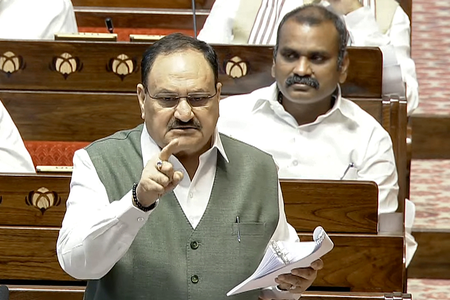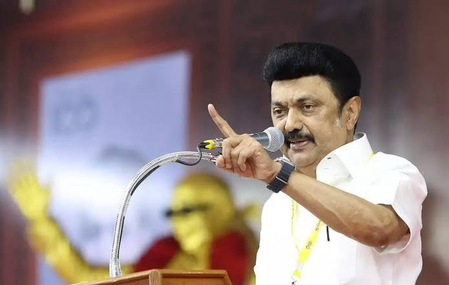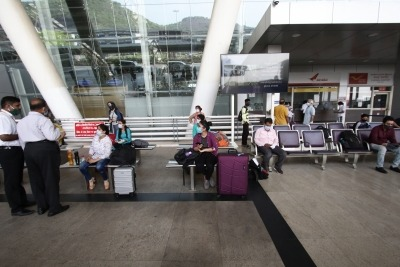
New Delhi, July 30 (IANS) Addressing the Rajya Sabha’s Operation Sindoor debate on Wednesday, Union Minister and Leader of the House Jagat Prakash Nadda sketched a bold comparison between the preceding decade (2004-2014) and the present era (2014-2025), highlighting India’s ‘robust transformation’ in national security, military response, and political will.
Operation Sindoor was executed with precision and power, he said. Nine terrorist camps, including Bahawalpur, Sialkot, and Muzaffarabad, were destroyed in just 22 minutes, he added. The masterminds behind the Pahalgam terror attack were neutralised through coordinated Operation Mahadev and Operation Sindoor, he informed the House. Nadda further said that major terrorist hubs – Lashkar‑e‑Taiba, JeM, and Hizbul Mujahideen – were demolished in a decisive strike.
Nadda, who is also the BJP national president, said that these actions showcased India’s operational strength. For the first time under the Modi government, India declared to the world: “Terrorism and dialogue cannot go hand in hand.”
Nadda laid bare the “failures” of the Congress‑led regimes from 2004 to 2014, where terror attacks remained allegedly unchecked, with responses limited to diplomatic dossiers or trade accords. Between 2004 and 2014, 7,217 terrorist incidents occurred; from 2015 to 2025, that number fell sharply to 2,150—an 85 pc reduction, Nadda said.
Civilian deaths dropped 70 pc (from 1,770 to 357), while terrorist casualties increased by 123 pc, he added. Stone‑pelting incidents in Kashmir had reached 2,654 each year before 2014; now they hover at zero. He told the members in the Upper House that the valley shutdowns have gone down from over 130 days to none. Army, police, and forces remained the same; the difference lay in political leadership, he roared.
Nadda recounted a litany of attacks during the Congress years, from Jaunpur (2005) and Varanasi (2006), to Mumbai, Delhi, and Ahmedabad, culminating in 26/11 (2008). Despite mass casualties, the Congress government continued trade pacts, confidence-building measures, and cultural exchanges with Pakistan, he alleged. There was no swift retaliation, he added. Instead, India offered biryani, visas, and better trade ties while bombs exploded in Indian cities, said Nadda. “Sweets were piled, while bullets streamed. Trade soared. They served biryani, we bled,” said Nadda.
According to him, by contrast, under the Modi government, India responded with bold military action. “Three days after the Uri attack in 2016, surgical strikes destroyed terror launch pads. Eleven days after the Pulwama attack in 2019, the Balakot air strike delivered a precise strike deep inside Pakistan. Thirteen days after the Pahalgam massacre in 2025, Operation Sindoor executed targeted strikes on airbases and terrorist camps with zero civilian casualties,” he said.
India used homegrown systems – BrahMos, Pinaka, radars, and artillery – reflecting a defence manufacturing transition from 32 per cent self‑reliance in 2014 to 88 per cent today, Nadda remarked. Not a single terrorist survived. No civilian was harmed. This, said Nadda, is “full‑moon India—decisive, transparent leadership.”
Nadda said that the global community strongly backed India’s actions. After the Pahalgam attack, 61 global leaders, including foreign ministers and heads of state, condemned the incident. Endorsements came from the UNSC, QUAD, BRICS, EU, France, Germany, and many others, he pointed out. International experts now tout India as a global defence model, applauding its domestic military manufacturing and strategic autonomy, said the BJP MP.
Nadda also revisited the Indus Water Treaty, calling it a historical mistake that granted excessive concessions to Pakistan. Signed in 1960, it had allowed Pakistan to dominate river rights even while sponsoring terror. PM Modi’s government has reversed these decisions, putting the Treaty in abeyance and reaffirming: “Blood and water cannot flow together.”
Throughout the address, Nadda emphasised that political leadership makes the defining difference. He challenged the Opposition, saying: “If you demand a discussion on Pahalgam, first ask what the previous political leadership accomplished.” He accused the Congress of appeasement, Muslim vote-bank politics, and weakening of terrorism laws.
He highlighted instances where Congress leaders referred to Hafiz Saeed with honorifics, where LoC aggression was ignored, and where national interest was subordinated to electoral gains.
Nadda urged all members of Parliament to embrace what he called the “Sindoor Spirit” — showcasing Indian resolve, pride, and unity. He called on the Opposition to accept the moment, contribute constructively, and take pride in national progress, whether in Parliament or on the field. His final appeal was unambiguous: the nation is bigger than any party — lend your support, and together build a stronger Bharat.
–IANS
brt/uk




